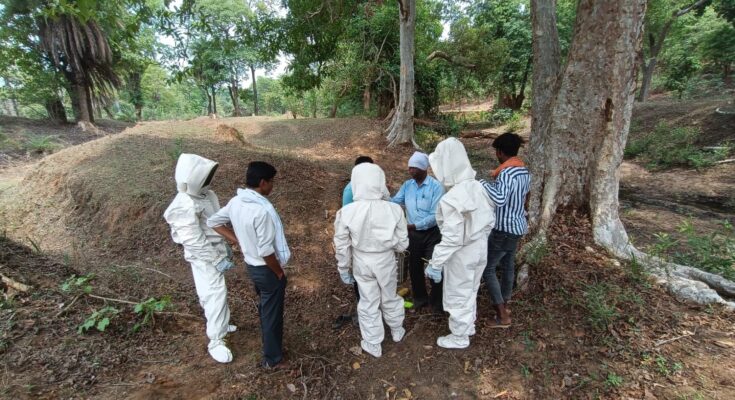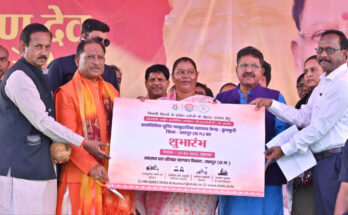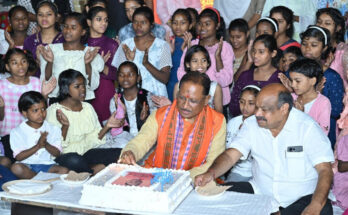Bees and honey bees will not be harmed in scientific collection
In the first phase, 11 district plans of the state have been selected for training.
Scientific training will be given to one thousand honey collectors across the state  Keeping in view the good prospects of honey production in the forest areas of Chhattisgarh, the work of training honey collection in modern scientific method has been started to the collectors who collect honey traditionally. In the first phase, 323 traditional honey collectors of 5 district unions are being trained. In the entire Chhattisgarh 1000 honey collectors will be given training in scientific method of collection. Survey work has also been started in the state for the forest areas which are rich in honey production. In the first phase, survey work in 5 district unions and training of collectors in 3 district unions has been completed by experts.
Keeping in view the good prospects of honey production in the forest areas of Chhattisgarh, the work of training honey collection in modern scientific method has been started to the collectors who collect honey traditionally. In the first phase, 323 traditional honey collectors of 5 district unions are being trained. In the entire Chhattisgarh 1000 honey collectors will be given training in scientific method of collection. Survey work has also been started in the state for the forest areas which are rich in honey production. In the first phase, survey work in 5 district unions and training of collectors in 3 district unions has been completed by experts.
The work of honey processing is being done by Chhattisgarh State Minor Forest Produce Association by posting honey manager in district union Kawardha, Bilaspur and East Bhanupratappur. The work of imparting training to the villagers through honey experts has been started after surveying the forest areas and collectors of honey producing forest areas and collectors with the experienced team members of National Level Center “Gramopyogi Vigyan Kendra, Dattapur Wardha Maharashtra”.
Under the initiative of Chief Minister Shri Bhupesh Baghel to increase the income of forest dwellers through collection and value addition of forest produce, the work of training honey collectors on scientific collection has been started by the State Minor Forest Produce Association. Scientific collection does not harm the bees and their hives. Also honey can be collected two to three times in a year from the same hive.
Under the guidance of Forest and Climate Change Minister Mr. Mohammad Akbar, 11 district unions Narayanpur, East Bhanupratappur, West Bhanupratappur, Dhamtari, Gariaband, Kawardha, Jagdalpur, Bilaspur, Dharamjaygarh, Katghora, in the first phase for survey of forest areas and training of honey collectors. Marwahi, in the second phase, seven district unions have been taken to Bijapur, Dantewada, Kanker, Khairagarh, Rajnandgaon, Korba, Jashpur and the remaining district unions in the third phase.
It is worth mentioning that wild honey of high quality is obtained in abundance in the forests of the state, but at the time of honey collection by the rural collectors, by burning fire under the hives by the traditional old method, the bees are driven away from the hives with smoke and the bees are completely destroyed. Honey is extracted by separating the hives from the trees. By this method the hive of bees is completely destroyed. Due to this, the number of bees is also decreasing drastically, due to which the production of honey is also gradually decreasing.
Without harming the bees and their homes (hives), honey production work can be greatly increased in the state, so that the State Minor Forest Produce Association in “Chhattisgarh, the bastion of possibilities” of honey production, has been developed in a modern scientific way for non-destructive honey production. It has been decided to encourage honey collection work. For this, the work of conducting survey of all honey forest areas and honey collectors and training honey collectors has been started. This will enable easy collection of honey without harming the honeycomb and honey bees and there will be a huge increase in the production of honey.
It is noteworthy that on the special initiative of Chief Minister Shri Bhupesh Baghel, Chhattisgarh State Minor Forest Produce Federation has provided 38 Minor Forest Produce species under the support price scheme through 901 Primary Minor Forest Produce Cooperative Society of 31 district unions and the rate fixed by the State Minor Forest Produce Federation. In this way a total of 65 minor forest produce species are being collected from the forest areas of the state. Wild honey is one of the 38 minor forest produce species being collected at the minimum support price. Which is currently being purchased at the rate of Rs 225 per kg from the collectors of the rural areas of the forest area.
Honey is collected in this way in a scientific way
To protect the honey collectors from the sting of honey bees by the trainers, a special dress is worn in which the sting of honey bees is not affected. By spraying water on the honeycombs of mountains, high stones by the collectors, and by climbing the trees with a ladder rope, the honey bees make a small incision with a sharp knife in the foreground of the hive, where the quantity of honey is highest. Honey is extracted without squeezing the honey. Due to this honey bees do not die and honey is extracted by making a light incision in the part of the hive. After repairing that damaged hive in about 7 days, honey bees make their own house like before by making honeycomb and start collecting honey again. In this way honey is collected two or three times in a year from the same beehive.
Scientifically, honey is obtained without destruction, without destroying the bees and their homes (hives) and saving the honey collectors from the sting of honey bees. Due to this, there will be a huge increase in the number of honey bees and hives and the collection and production of honey will increase and the stock of honey will increase in the state. This will increase the income of the villagers of Vananchal area. In the last years, due to the old traditional method of collection, there has been less collection of honey. This year, due to the collection work with new technology, the goal of honey collection will be achieved easily.
Scientific training to 323 honey collectors of five district unions
According to the information received from Mr. Sanjay Shukla, Managing Director of Chhattisgarh State Minor Forest Produce Association, in the first phase, 323 traditional honey collectors of 5 district unions are being surveyed and given scientific training, including 30 collectors of East Bhanupratappur District Union, West of Bhanupratappur. 20, 90 of Narayanpur, 70 of Dhamtari and 113 of Gariaband District Union are involved in honey collectors.
According to the information received by Chhattisgarh State Minor Forest Produce Association, a target
of 2770 quintal honey collection has been set in the year 2022-23, against which 240 quintal honey has been collected till June 30. According to the information received, 323 quintals of honey were collected in the year 2020-21, 349 quintals of honey in the year 2021-23.




